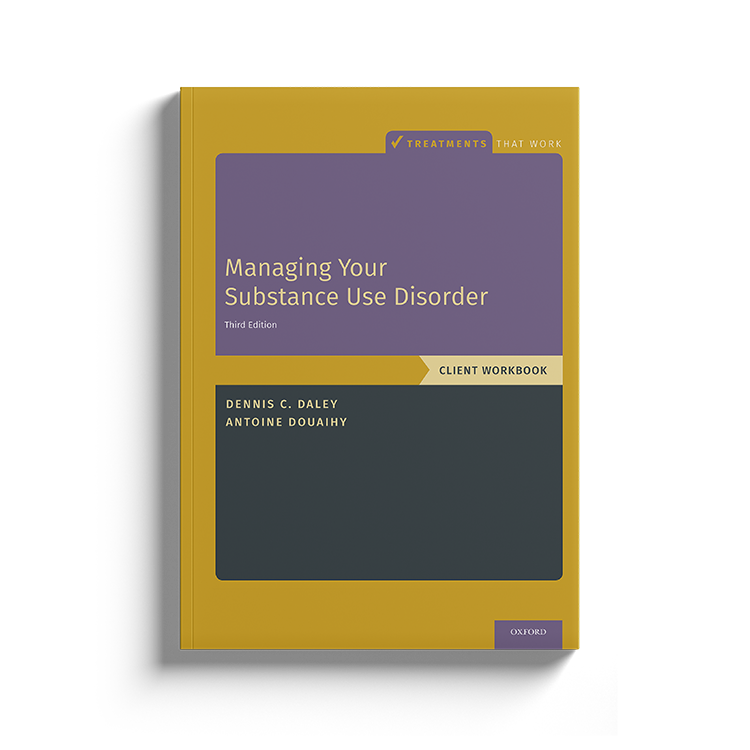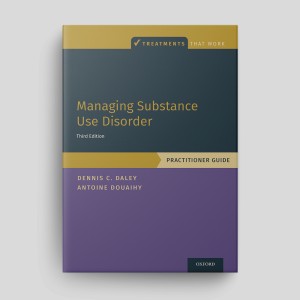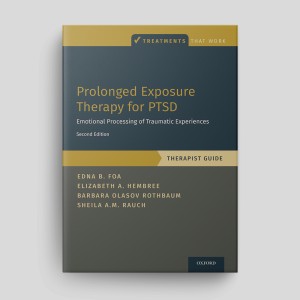Managing Your Substance Use Disorder (Third Edition): Workbook
The Managing Substance Use Disorder program provides step-by-step instructions and evidence-based strategies for supporting individuals who use substances. A practitioner guide is downloadable separately.

Download or send

Overview
Psychosocial interventions such as cognitive behavioral therapy (CBT) can help individuals overcome substance use. They are recommended by the UK National Institute for Health and Care Excellence (NICE) and American Psychiatric Association (APA) for treating substance use disorders. The Managing Your Substance Use Disorder program is written by Dennis C. Daley and Antoine B. Douaihy, and it provides therapists with the tools they need to deliver effective, evidence-based treatment for substance use disorder. Part of the Treatments That Work™ series, this manualized guide provides a detailed description of screening and assessment strategies and treatment approaches (medications and psychosocial), alongside the application of evidence-based interventions in practice. Mutual support programs and the most common challenges faced by individuals with a substance use disorder are also discussed, such as managing cravings, resisting social pressures to use substances, coping with negative emotions and moods, building a social support network, involving family or concerned significant others, and reducing relapse risk.
Why Use This Resource?
This program provides a step-by-step, structured approach for managing substance use. It includes:
- Detailed psychosocial interventions for managing substance use, such as managing cravings and difficult emotions.
- Practical guidance for structuring sessions and implementing client exercises.
- Strategies for overcoming common obstacles during treatment.
Key Benefits
Structured
Educational
Effective
Trusted
Who is this for?
Substance Use Disorders
Useful strategies for individuals using alcohol, opioids, stimulants, and other substances.
Alcohol Use Disorder
Patterns of alcohol consumption that lead to distress or impairment.
Opioid Use Disorder
Dependence on prescription or illicit opioids.
Stimulant Use Disorder
Chronic use of substances like cocaine or methamphetamine.
Cannabis Use Disorder
Persistent and problematic marijuana use.
Polysubstance Use
Use of multiple substances with associated health risks.
Co-occurring Mental Health Disorders
Substance use problems alongside anxiety, depression, or trauma-related conditions.
Integrating it into your practice
Assessment
Explore clients' substance use.
Psychoeducation
Teach clients about factors that can maintain substance use.
Skills
Implement helpful psychological interventions to address key areas.
Monitoring
Use structured worksheets to track progress and refine interventions.
Relapse Prevention
Equip clients with long-term strategies for maintaining their progress.
Theoretical Background & Therapist Guidance
Substance use disorders represent a major public health issue (Calabria et al., 2010), affecting around 6% of individuals in the US (SAMHSA, 2017). Symptoms include taking substances in large amounts or for longer than is recommended (despite the difficulties this causes), alongside intense urges and cravings. This often leads to problems with health, relationships, work, or leisure activities. Substance use disorders are sometimes accompanied by tolerance (needing to use more of the substance to achieve the same effect) and/or withdrawal (experiencing unpleasant side-effects when the substance is not used).
Significant advances have been made in treating substance use disorders over the last 30 years. This has led to the development and validation of a range of psychosocial interventions including cognitive behavioral therapy (CBT), motivational enhancement interventions, mutual support and self-help, and relapse prevention. Progress has also been made in addressing the difficulties accompanying substance use, such as anxiety and depression.
Research suggests that many psychosocial interventions can help address a range of substance use disorders (Dutra et al., 2008). For this reason, they are recommended by the American Psychiatric Association (APA, 2010) and the National Institute for Health and Care Excellence (NICE), which produces guidelines for the National Health Service in the United Kingdom (NICE, 2007, 2011). NICE also recommends the use of cognitive behavioral therapy (CBT) for alcohol-related problems (NICE, 2011) and when treating co-occurring difficulties such as anxiety and depression amongst drug users (NICE, 2007).
Managing Substance Use Disorder is a comprehensive program to assist practitioners in delivering effective, evidence-based interventions. The program includes two books:
- Managing Substance Use Disorder: Practitioner Guide details the step-by-step treatment plan for substance use disorder.
- Managing Your Substance Use Disorder: Workbook is the companion to this practitioner guide. It will help your patients become active participants in their treatment and learn how to address the personal and interpersonal issues related to substance use, as well as relapse prevention.
Authored by leading psychologists including David Barlow, Michelle Craske and Edna Foa, Treatments That Work™ is a series of manuals and workbooks based on the principles of cognitive behavioral therapy (CBT). Each pair of books - therapist guide and workbook - contains step by step procedures for delivering evidence-based psychological interventions and will help you to provide the best possible care for your clients.
At Psychology Tools, we are proud to make many of the Treatments That Work™ titles available to our members. Each book is available to download chapter-by-chapter, and Psychology Tools members with a currently active subscription to our ‘Complete’ plan are licensed to share copies with their clients.

What's inside
- Psychoeducation on substance use disorders and treatment options.
- Worksheets for tracking cravings, triggers, and progress.
- Guidance on managing emotions, thoughts, and behaviors.
- Strategies for relapse prevention and maintaining motivation.
- Exercises to enhance self-efficacy and build a recovery-supportive lifestyle.
FAQs
How This Resource Improves Clinical Outcomes
By integrating this program into therapy, therapists are able to:
- Deliver a structured, comprehensive treatment specifically developed for substance use.
- Implement valuable psychosocial interventions.
- Help clients maintain long-term gains through relapse prevention strategies.
- Tailor treatment to meet diverse client needs.
Clinicians Who Use This Resource Also Use
References And Further Reading
- American Psychiatric Association. (2010). Practice guideline for the treatment of patients with substance use disorders (2nd ed.). Retrieved from: https://psychiatryonline.org/pb/assets/raw/sitewide/practice_guidelines/guidelines/substanceuse.pdf
- Calabria, B., Degenhardt, L., Briegleb, C., Vos, T., Hall, W., Lynskey, M., Callaghan, B., Rana, U., & McLaren, J. (2010). Systematic review of prospective studies investigating "remission" from amphetamine, cannabis, cocaine or opioid dependence. Addictive Behaviors, 35, 741-749. https://doi.org/10.1016/j.addbeh.2010.03.019
- Dutra, L., Stathopoulou, G., Basden, S. L., Leyro, T. M., Powers, M. B., & Otto, M. W. (2008). A meta-analytic review of psychosocial interventions for substance use disorders. American Journal of Psychiatry, 165, 179-187. https://doi.org/10.1176/appi.ajp.2007.06111851
- National Institute for Health and Care Excellence. (2007). Drug misuse in over 16s: Psychosocial interventions (NICE guideline CG51). Retrieved from: https://www.nice.org.uk/guidance/CG51
- National Institute for Health and Care Excellence. (2011). Alcohol-use disorders: Diagnosis, assessment, and management of harmful drinking (high-risk drinking) and alcohol dependence. Retrieved from: https://www.nice.org.uk/guidance/cg115
- Substance Abuse and Mental Health Services Administration. (2017). Key substance use and mental health indicators in the United States: Results from the 2016 National Survey on Drug Use and Health (HHS Publication No. SMA 17-5044, NSDUH Series H-52). Rockville, MD: Center for Behavioral Health Statistics and Quality, Substance Abuse and Mental Health Services Administration. Retrieved from: https://www.samhsa.gov/data/
Why Psychology Tools?
Get Support
Sign Up
- © 2025 Psychology Tools. All rights reserved
- Terms & Conditions
- Privacy Policy
- Cookies Policy
- Disclaimer
We value your privacy
This site uses strictly necessary cookies to function. We do not use cookies for analytics, marketing, or tracking purposes. By clicking “OK”, you agree to the use of these essential cookies. Read our Cookie Policy




